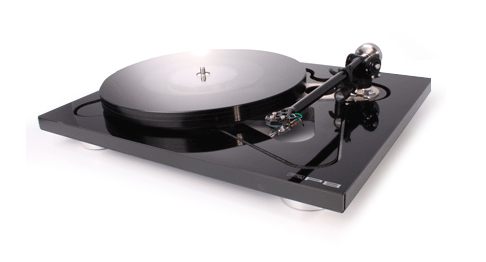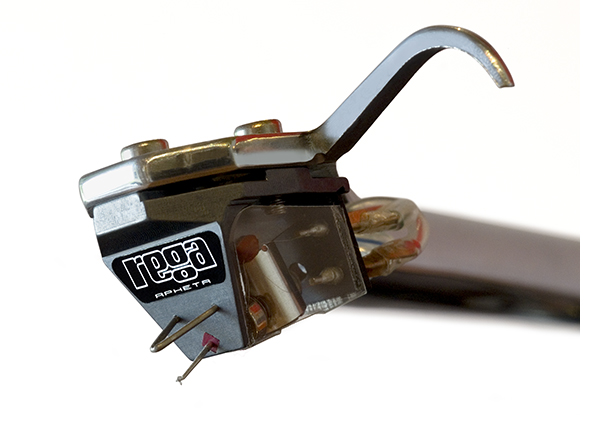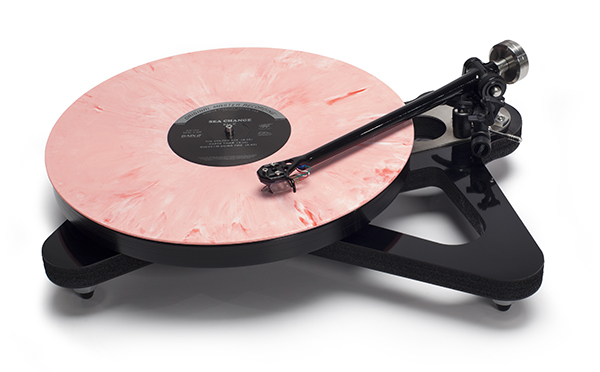Rega RP8 Turntable
Five years ago, when visiting the Rega factory in the UK, I joined a group of Rega dealers to witness something very special at Rega founder Roy Gandy’s house.
A new skeletal plinth design that was supposed to be a step above the flagship P9, featuring a one off, ceramic platter and what appeared to be an RB1000 tonearm. Needless to say the sound was fantastic and the following day, back at the factory, we saw more. Gandy and staff were coy, referring to it as a “prototype,” and a “work in progress,” tempering our enthusiasm, telling us that “it could be out in a few months, a few years, or not at all.” So, I returned to the States empty-handed, but I did learn how to play cricket.
But time flies when your having fun, and we now have the RP8, looking surprisingly like that prototype I saw years ago, but for a few minor changes. And, on one level the RP8 is a pretty big jump forward for Rega. They have always championed a low mass plinth design as the path to analog greatness and the website hints that “this is the first of the skeletal plinth designs.”
Featuring a new RB808 tonearm, which looks like a further refinement of the direction taken with the RB303 on the RP6 turntable, introduced last year, and also features new, lower capacitance tonearm cables, that look very audiophile-like in nature. The RP8 has an MSRP of $2,995, however US customers can purchase one with Rega’s $1,800 Apheta MC cartridge attached and set up for $3,995. A major bargain, if you have the right phono stage.

The hub/subplatter features a machined aluminum cap, extending all the way down so the belts can contact the full surface. Rega claims that this, combined with the new tonearm provides for increased resolution, and the first record auditioned, Herbie Hancock’s Empyrean Isles brings a new perspective on this Blue Note classic, and illustrates a turntable, tonearm and cartridge all working together as a system.
One of the toughest things facing an analog enthusiast is getting this combination correct, so that the optimum trackability, resolution and stereo separation can be achieved. Freddie Hubbard’s Coronet bleats out of the left channel, completely occupying the left half of the listening room, with the proper height and spatial relationships – is both beguiling and convincing. The drum kit is miked equally hard right, with Hancock on piano, gently floating in the middle, with Ron Carter’s bass keeping the bass on track, yet dissolved into the stereo image.
Quick Comparisons – up and down the range
Utilizing the Audio Research REF Phono 2SE, with two identical inputs and the ability to load both phono cartridges at the 50 ohms required for utmost HF smoothness (and honestly, my ARC SP11 mk.2, with it’s 30 ohm setting is pure bliss with the Apheta moving coil cartridge, but alas only one input) makes it a snap to compare the RP8 to both the RP6 and P9 to see just how much higher the bar has been raised.
The MoFi version of Aimee Mann’s Lost In Space underscores the improvements on two levels. This densely layered record needs a first rate analog rig to lay bare all the intriguing textures and spatial cues, which the RP8 aces. Perhaps even more intriguing is the LF performance of the RP8 – it’s very close to that of the P9. If you haven’t experienced the P9, it’s not like the rest of the Rega range. It possesses incredible weight and body. The RP8 has a similar weighty feel, you almost don’t expect this kind of locked in bass response to come from a table that is the opposite of some of todays massive record players.
That machined aluminum subplatter pays another big dividend; much better pitch stability, and consequently revealing more low level detail. Where Mann’s delicate voice wavers ever so slightly during “Guys Like Me” on the RP6, it is rock solid when switching to the RP8. This doesn’t mean the RP6 is rubbish, you don’t notice the difference as easily until you play it right next to the RP8, and let’s face it, the RP8 costs twice as much.
The biggest surprise comes in a side-by-side comparison with the P9. While the $5,000 P9 still has more LF weight and an even dreamier, more defined high end, the RP8 closes the gap tremendously, leaving this reviewer to wonder what Rega has on the horizon with the RP10. An urge to spin the recent remaster of Devo’s Q: Are We Not Men? A: We Are Devo! Illustrates the huge soundstage the Apheta is capable, with synthesizers and special effects everywhere. Moving up to the P9 offers an even bigger soundfield, yet pace and timing are equally enticing with both decks, yet the P9 takes the lead, with the opening, distorted bass line of “Mongoloid,” offering more grunt and more texture.
Ticking the necessary boxes
It wouldn’t be an audiophile review without some female vocals, eh? The Low + Dirty Three In the Fishtank 7 LP seemed the perfect place to start, with it’s dreamy, ethereal vocals, fading way off into the distance of the soundstage on the opening track, “I Hear…Goodnight,” with Mimi Parkers gentle brushwork on the drums so faint, it would be lost on a budget rig. This record also clearly illustrates the ease by which the Rega combo handles the violin – exquisite.
Going up in tempo to Me’Shell Ndegeocello’s Plantation Lullabies proves that the RP8 and Apheta can rock in a major way; Ndegeocello’s thunderous bass riffs command authority with this table and cartridge anchoring her sensuous vocals all the while.
We covered the Apheta in detail in issue 10 at it’s introduction. In five years, it’s only gone up in price $300 and my opinion hasn’t changed. This is a fantastic cartridge with a lightnening fast response, but it must be loaded properly or it will sound harsh and thin. With comparisons to the RP6 and P9 out of the way, I could go back to in-depth listening through the ARC SP-11 mk.2, which has an incredible on board phono stage that just happens to have a loading setting of 30 ohms – perfection for the Apheta.
This allows the cartridge to have maximum dynamics, smoothing out the HF response at the same time. Keith Richards “You Don’t Move Me,” From his Talk is Cheap album features great acoustic playing by the riff meister that hangs between the speakers. Richard’s voice has never been his strong suit, yet it is rendered with plenty of body here.
Regardless of the program material chosen, the RP8/Apheta combination delivers the goods. Though you’ll save a few bucks should you choose an Exact 2 cartridge, if you have a phonostage up to the task, the extra $500 for the Apheta upgrade is the smartest $500 you’ll ever spend in the world of analog.
 The nitty gritty
The nitty gritty
For those not familiar with Rega turntables and phono cartridges, they are the ultimate in simplicity, when it comes to setup. The Apheta cartridge uses three screws instead of the usual two and this provides perfect alignment. Your RP8 can arrive with the Apheta already installed, so all you need to do is five minutes of basic assembly (fit the belt, the platter and set tracking force/anti skate) Analog bliss is about 15 minutes away, if you’re really poking.
Personally, I love the skeletal plinth and as I have no children or furry creatures to threaten my analog world, I can bask in the RP8s high tech glory. Those less fortunate, fear not. The RP8 comes with a traditional plinth and dust cover that will protect it from the environment. I could not discern any audible advantage or disadvantage to the extra hardware, but congratulate Rega for providing it. My audiophile buddies were polarized, they either thought the RP8 was really cool, or tried to explain to me how it couldn’t work.
We could discuss techie bits in further detail, but you can read about that here, on Rega’s website. Suffice to say they all work together brilliantly and the RP8/Apheta combination reveals more music than most in its class, if not all. Mounting the Apheta on the VPI Classic 1 gives a warmer, slightly more bass heavy presentation, but it does not offer up the resolution that the RP8 does. It’s like the difference between a Mini Cooper S and my Fiat Abarth. You either prefer the more nimble ride of the Abarth or the somewhat more posh ride of the Cooper. There’s no wrong choice.
However, if you want a high performance record player with next to zero fuss required, I can think of no better choice.
My Rega journey began with the Planar 3 in 1982, and somehow over thirty years later, I have the feeling it’s not over. Roy Gandy and his crew are a clever group, and as long as they keep refining their turntables, there will be new vinyl adventures from this fine British company. I’m very happy to award the RP8/Apheta combination one of our Exceptional Value Awards for 2013.
-Jeff Dorgay
 The Rega RP8 Turntable
The Rega RP8 Turntable
MSRP: $2,995 ($3,995 bundled with Rega Apheta MC cartridge)
www.rega.co.uk (factory)
www.soundorg.com (US importer)
Peripherals
| Cartridge | Rega Apheta MC |
| Phonostage | Audio Research REF Phono 2SE |
| Preamplifier | Audio Research REF 5SE, Audio Research SP-11mk. 2 |
| Power Amplifier | Octave Jubilee Monoblocks |
| Speakers | Sonus faber Guarneri Evolution |
| Cables | Cardas Clear |
| Power | IsoTek Super Titan |
| Accessories | Furutech DeMag, DeStat, GIK acoustic treatments |


